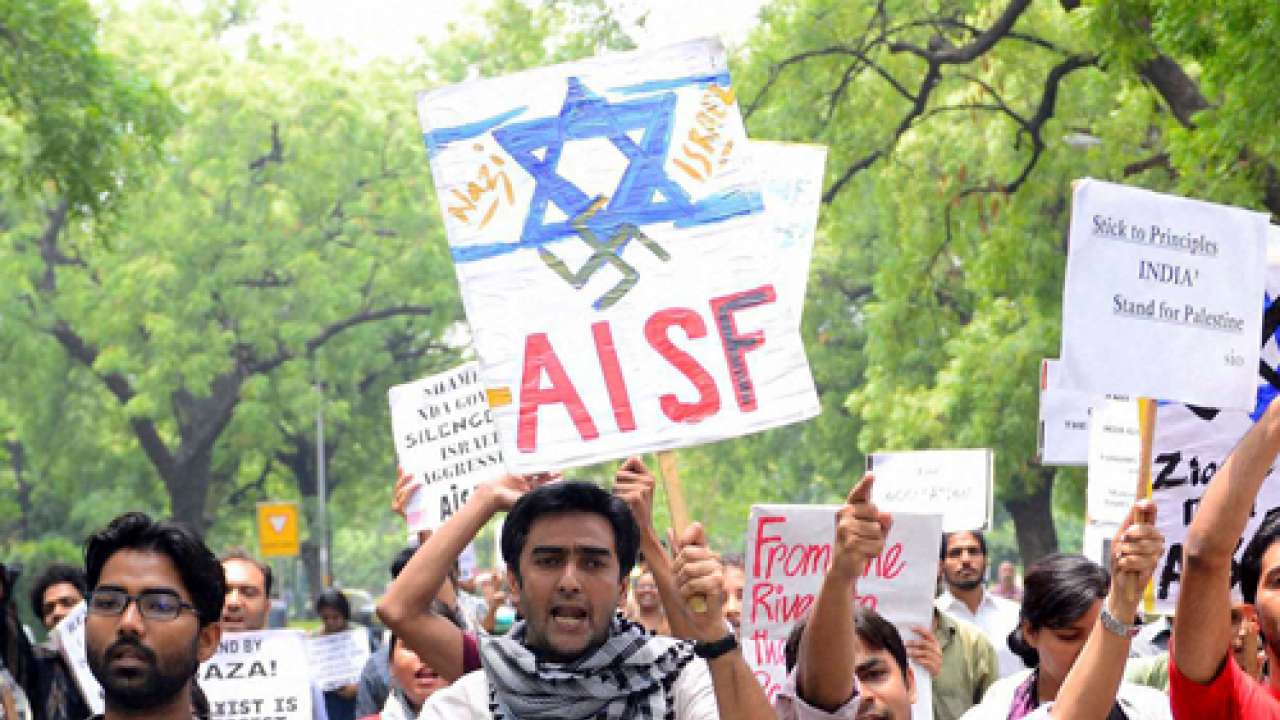
The Indian parliament witnessed a day of ruckus after the government “blocked” a debate in the Rajya Sabha on the Israel-Gaza situation. The reason given to block such a debate during the house’s question and answer hour was that the government did not want “discourteous” reference to any friendly countries.
“We have diplomatic ties with both (Israel and Palestine) nations. Any discourteous reference to any friendly country can impact our relations with them,” said an unamused external affairs minister Sushma Swaraj.
In an official statement, the Ministry of External Affairs (MEA) said India was “deeply concerned” at the steep escalation of violence between Israel and Palestine over the past few days, particularly with the “heavy air strikes in Gaza”. The statement then restored the balance which reflects India’s current stance by saying India is also alarmed at the “cross-border provocations resulting from rocket attacks against targets in parts of Israel”.
Since New Delhi established diplomatic ties with Israel in 1992, its traditional policy in the region which previously exclusively favoured the Arab nations shifted as it looked to establish basic ties with Tel Aviv (Nehru only recognised the state of Israel in 1950, even though Israel asked New Delhi for official recognition in 1948).
Even though New Delhi recognised Palestinian statehood in 1988, Israel had planted the seeds for closer ties with India back in 1971, when India fought with Pakistan with almost no diplomatic or military support from the international community. During this period, then Israeli Prime Minister Golda Meir showcased support for India’s stance. Under Meir, Israel secretly got one of its weapons manufacturers to supply India with a limited stock of mortars and much needed ammunition, along with a few personnel to help with the new equipment. With New Delhi not being in a position to play diplomacy, it asked Israel for further assistance in areas such as weaponry, and Meir promised to keep helping.
In 1998, when India tested its nuclear bomb in Pokhran, the direct fallout for New Delhi was a host of sanctions, including a United Nations Security Council (UNSC) resolution (1172) in June 1998 condemning India (and Pakistan which tested days later). These sanctions against New Delhi severely disrupted its economy, specifically the country’s largely import-reliant defence sector. Israel did not condemn India for conducting nuclear tests, nor did it publish an official response to the tests.
This was, possibly unknowingly, a turning point for Indo-Israel ties. Israel, which today has a thriving defence industry, is quickly becoming a major shopping avenue for the Indian armed forces. The outcome of the long sanctions post-1998 for India was the realisation that it needed to expand its sources for defence procurements in order to avoid exposure to such sanctions again.
The rapidly increasing defence ties between India and Israel are further strengthened with both countries viewing each other as victims of terrorism. With the attack on Chabad House on 26/11 in Mumbai, Israel looked to push its defence and security ties even further. However, then Prime Minister Manmohan Singh’s government was too busy trying to please the United States and initiate the civil nuclear agreement to pay much heed to Tel Aviv’s moves. A similar situation, albeit at a smaller level, arrived again when an Israeli diplomat’s car was targeted by terrorists in New Delhi.
However, all these things considered, Tel Aviv is well aware of the limitation it faces regarding its relations with India. While Israel has a lot to offer, in return both diplomatically and politically, New Delhi has very little to offer to Tel Aviv. With the world’s second largest Muslim population, it is in fact India’s domestic policies which dictate Indo-Israel relations. Israel and other countries in the region know that New Delhi is not going to partake in taking sides over conflicts it need not get involved in.
The juggling act between maintaining ties between Arab allies and Israel is visible for everyone to see. After India showed interest in investing in oil and gas fields off the coast of Israel, Kuwait, which is known to have been prodded by Saudi Arabia, privately wrote to the MEA making its displeasure known. In another instance, the Indian government cancelled invitations to Israeli companies and executives at a premiere oil and gas gathering in the capital in order to not upset visiting Arab dignitaries and officials.
Israel is expanding its operations with a full ground offensive in the 40 km long, 7 km wide Gaza strip, and Tel Aviv can expect a rebuttal from India over its actions. However, the Israelis also know to acknowledge India’s concerns over the issue and proceed to ignore them. This is what the India-Israel relationship is currently based on, pure and cold strategic business.
Indian politicians sitting in the opposition to Prime Minister Narendra Modi’s new government calling for a resolution or statements officially condemning Israel’s actions in Gaza are perhaps in for a disappointment. As is the case in foreign policy, the politics of national interest trumps the requirements of acknowledging rights and the wrongs.
Kabir Taneja, 28, is a Delhi-based journalist. He tweets at @KabirTaneja.